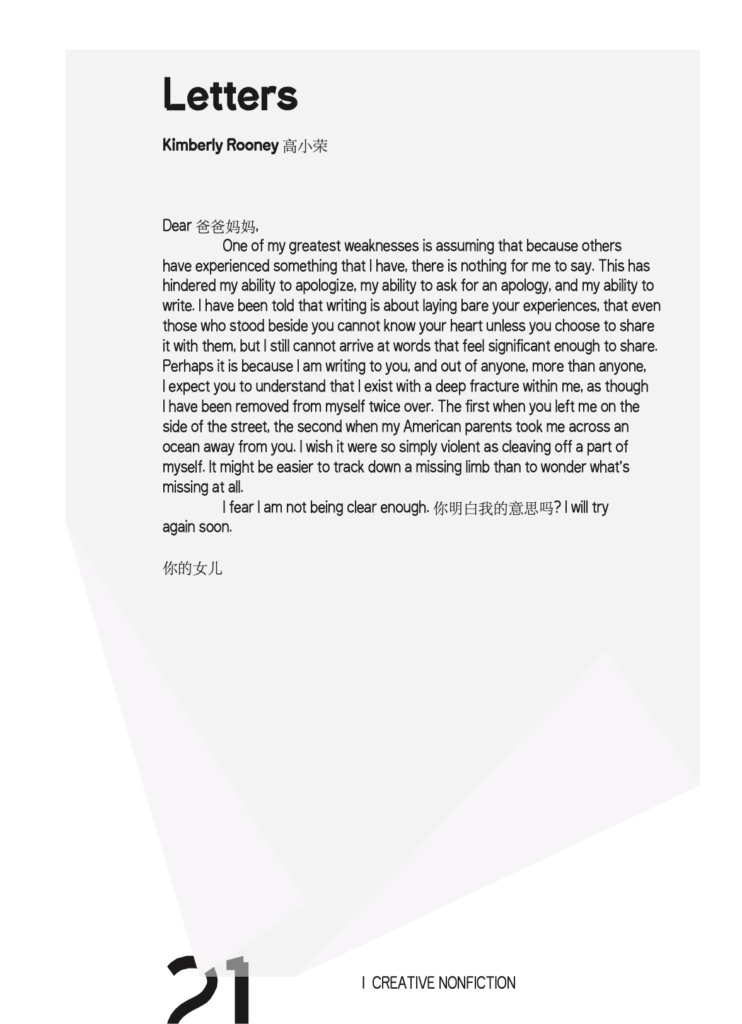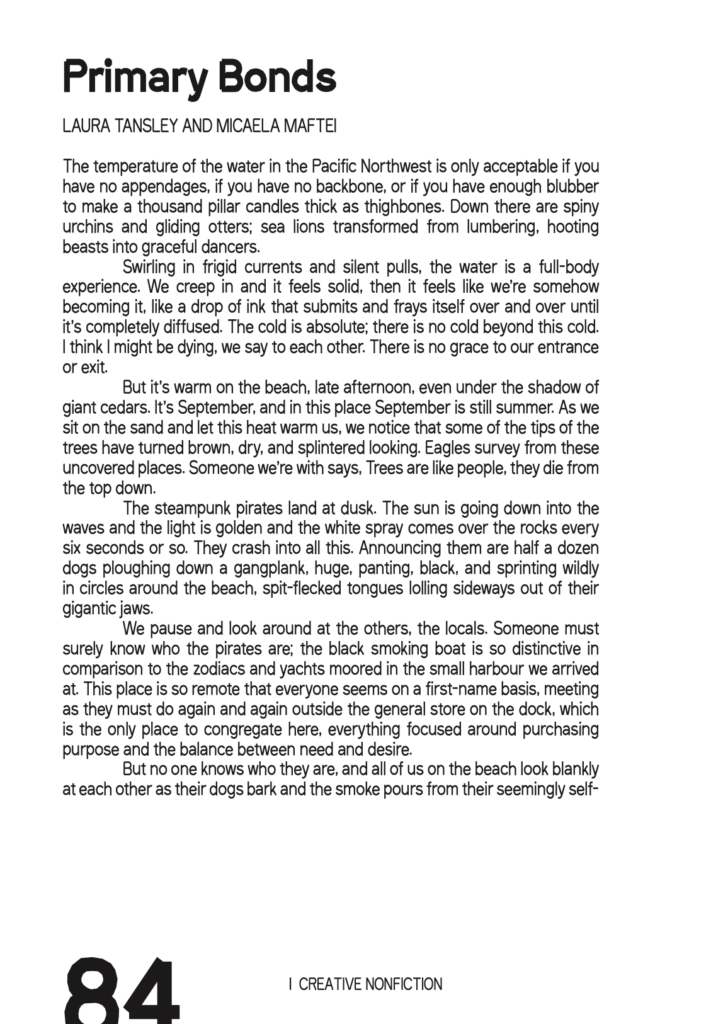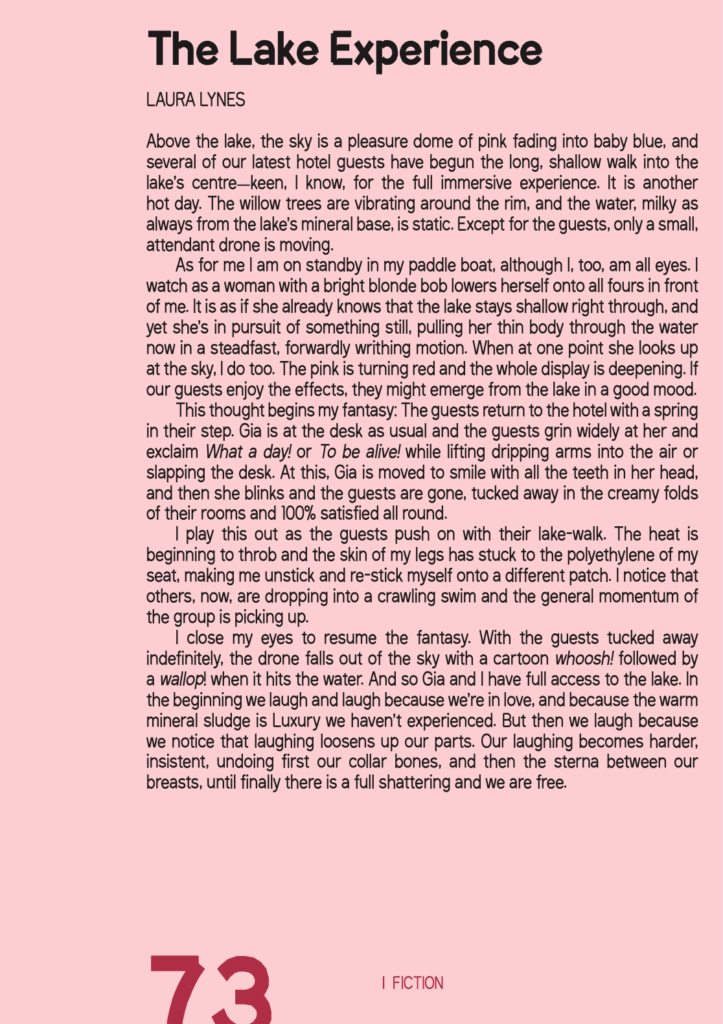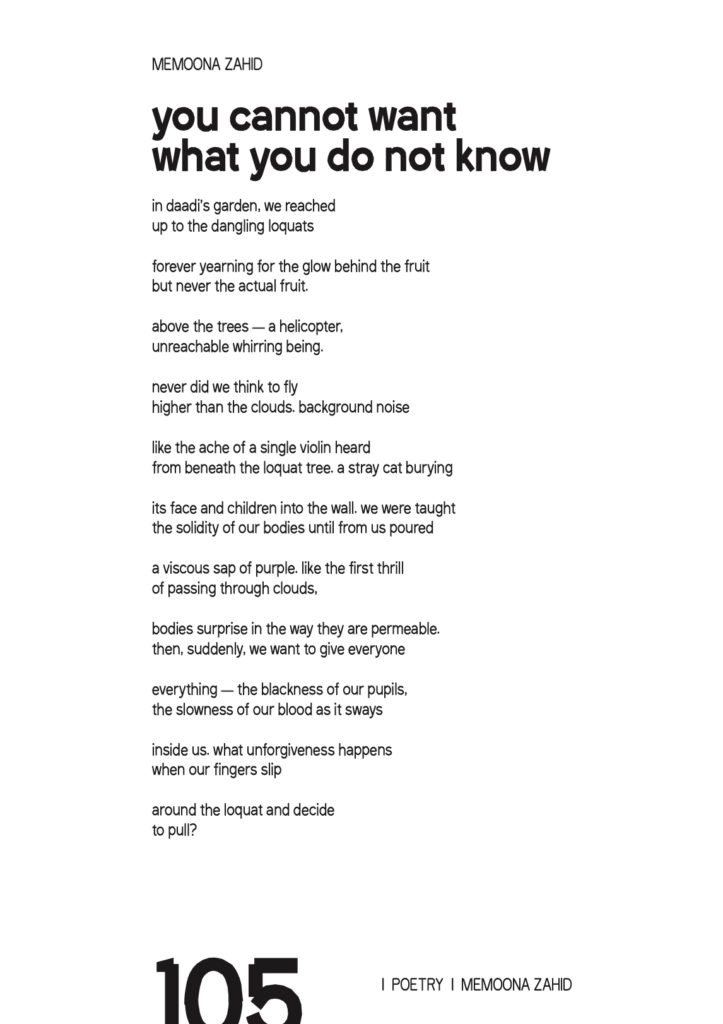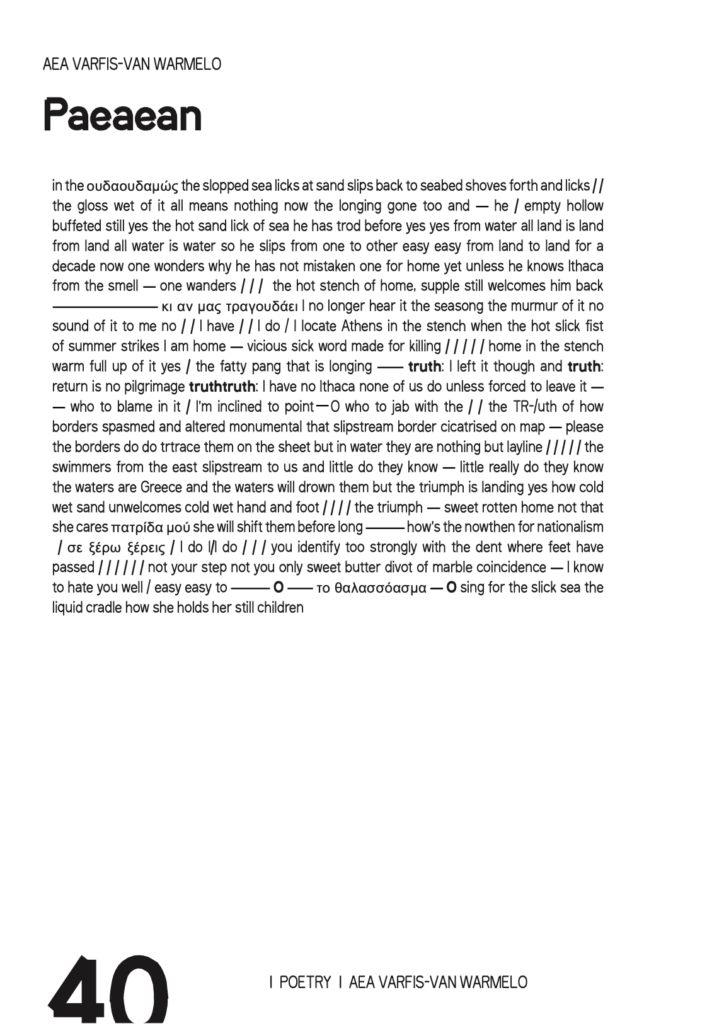One of those classic Romeo and Juliet stories. This happened to a girl I knew, Alice, who was from a really Republican family, and this guy Liam, whose parents literally voted for Ralph Nader. Alice can still remember the first time she ever saw Liam, back at a high school party on the lake. He wasn’t wearing anything special: blue jeans and a sweater, but on boys like him everything was tilted to the left. Slanted, like a poem. And yeah, sure, maybe part of what made him so magnetic was also the story she’d heard from her friends about how he’d once tried to kill himself in a barn somewhere. Sure, a story like that was pretty exciting to her at the time. Alice was like most sixteen-year-olds from where we were from and felt like real life was something that only happened to other people. She was thirsty for it.
Later, in college Alice was one of those girls who wore UGGs. She wanted a job in a glass office where she made lots of money to go on trips to Europe and the beach. She liked nice things, like purses and cruises and charcuterie. Sometimes just thinking about sausage laid out on a wooden board with a raw edge got her wet. We are all entitled to our sexualities. To this day I can hardly come without picturing the guy that used to date my older sister Chantelle.
Then, at the beginning of Alice’s second year of college a friend told her that guy Liam was transferring to their school on academic scholarship. You know, the one who tried to kill himself in high school. The next thing she knew he was in all her electives. He sat up front and dominated the group discussion. Sometimes guys have something to the tenor of their voices. This isn’t science, but you feel the vibrations down to your pussy. Alice thought, how? He’s so radical! I’m from such a conservative family.
One night she dared herself to bum a cigarette from Liam at a party, wondering if he’d recognize her from high school, though he didn’t. She was like most of us were, literally invisible.
“You don’t really smoke, do you?” he said after a while, when the rest of the doorway had cleared. “You’re not doing it right.” He took the cigarette out of her mouth and sucked on it for her with his eyes closed. “See, like this?”
Alice wanted to die. She thought she’d crumble right there onto the pavement. She had a boyfriend in Rhode Island who wanted to marry her, but it wasn’t her real life. Her real life began now.
Maybe they kissed on the bus. What if they touched in the closet? One day they pointed out all the dogs in the park. When I was seventeen, the boy I liked carved my initials into his leg but there is no way for me to describe exactly how this made me feel 100% accurately.
Alice watched Liam sleeping beside her and thought, you are so beautiful, why would you try to kill yourself in high school? Don’t you know that on you everything is slanted like a poem? Thousands of girls would kill to be beautiful the way you are.
Sometimes I’m sure they didn’t even have sex. They told jokes and shared memories from childhood. Liam was studying library sciences and wanted to make thirty grand a year, he loved books and foreign films. It was one of those classic Romeo and Juliet stories. He asked Alice to close her eyes and describe what the inside of her brain was like.
“Uh, just darkness?”
He said, “No, behind the darkness. Look past it.”
“Fire,” she said.
“I see fire too. I see people dancing. They’re all on fire.”
This might not be real, Alice kept telling herself. Imagine how he’d fare with her dad at Thanksgiving. Or maybe she was on her period. She was always on her period. Even when Liam said he loved her for the first time, one night drunk out of his mind, did she think about what fathers like ours are always telling girls like us about yielding power any chance we get? Did she clench her jaw, swallow her whole heart and laugh, “Ha ha, you’re sweet”?
Alice cradled his face and his darkness was palpable to her, a dimension that proved he had known things. When you tried to kill yourself, she wanted to ask. Did you see a light?
I picture Alice watching Fox News one day when a friend calls. “I’m doing really well,” she says. “I think I’m in love with Liam. You know, the guy from our high school who tried to kill himself.”
Her friend clears her throat. “Liam Crastor?”
“Yeah, you remember him?”
I was like, oh my god, the friend writes later in a personal essay online, sweetie you’ve got it twisted.
“He tried to kill his girlfriend. Chantelle, the slutty one. He strangled her in a shed at her family’s cottage. Everyone knew! I mean, we knew but no one believed her at the time. Like Santa Claus kind of?”
Does Alice’s spine start to burn?
Has Liam really never mentioned my sister Chantelle?
His defense is that every poor boy wants to date a rich girl at least once in his life, even if said rich girl disrespected every cell of his being, i.e. his hygiene, love of old novels, how his parents voted for Ralph Nader. Chantelle changed the way he dressed entirely and made him get an eighty-dollar haircut. But my sister is just so beautiful, she has hair like an Afghan dog. You can’t buy that. There’s no product or vitamin. How the two of us share DNA is an advanced math equation. Girls like my sister Chantelle convince poor boys they too deserve nice things.
I of all people understand the way Liam looks, how on him everything is slanted like a poem. All week I would wait for him to come over on Fridays and watch movies with my sister. They draped the flag blanket over their laps on the couch. “Oh my God, Lilly you perv!” she’d say when she caught me staring. “Mom! Lilly’s bothering us!”
Once Liam gave me a Tootsie Roll from deep inside his pocket, it had been squished along his thigh like a fossil. It’s probably still in my room. I’m sure I could find it somewhere. I’d eat it slowly, chew for the rest of my life.
I was thirteen and they were seventeen, three months away from high school graduation when Chantelle begged our parents to let Liam come to the Cape with us. She said he’d never seen the ocean before and it was our responsibility to share our privilege. “God Mom, do you even watch the news?” She lowered her voice, “His family doesn’t even use Q-tips.”
The morning it happened started with breakfast. I was downstairs with my parents, Liam and Chantelle were upstairs. We heard the bed creak and mom turned up the bacon. It was hot, too hot for the beach. Mom was always worried about the sun, dad liked to disappear on his boat with other men. When they were ready, Liam and Chantelle came downstairs and the three of us sat on the veranda. I was reading a book about whales and he was teaching her how to play chess, but she wasn’t listening.
“No,” Liam said. “That’s the rook.”
All Chantelle did was make jokes about putting them inside of her. That was her en passant, making everything about sex and there was no way anyone could challenge her. She’d been doing it since she was fourteen.
Liam threw a knight and it landed by my feet.
“Are you a fucking psycho?” said Chantelle.
“I’m sorry, Lilly.” It was the first and only time he ever said my name.
He stood up to leave and Chantelle ran after him. “Tell mom and dad we’re fine,” she said to me.
The next thing I knew the neighbors were on the phone, they’d heard Chantelle with a strange boy in the dunes and called the police. My parents picked her up from the station and she was still crying. Mom put on You’ve Got Mail and nobody said a word. Nobody ever told me anything actually, I wasn’t old enough. Chantelle had bruises for a week.
Later, Liam wrote a long letter that only my parents were allowed to read. As a child he’d never been breastfed, his parents were divorced, the last one in class to lose a tooth, his dad passed out on the lawn, the dog died, only wore hand-me-downs, had a learning disability, was afraid of the dark. Please, try to forgive me.
I cobbled together what I could from eavesdropping on the stairs. Chantelle was in the bath. She took a lot of baths during this time. She got really into barre fusion, then moved away for college and had alcohol poisoning three times her first semester.
Now it’s been almost four years and she’s really into HIIT Tabata. She stays upstairs in her room all Christmas doing jumping jacks. It rattles the whole house, but no one says anything. Mom is making cookies out of flax; dad has men in the parlor.
One night Chantelle has friends over and they scroll on their phones. “Can’t believe he actually has a girlfriend,” they say. Without using his name, everyone knows who they’re talking about, as if there’s only one “he” in the universe, though of course there are many. Men, I see them almost every day. They have their own television shows.
“How could you fuck a guy like that and still respect yourself?”
“Yeah but I heard her dad voted for Trump.”
“Maybe she doesn’t know.”
“How could she not? Everyone knows!”
“Look at this picture, she totally has a moustache!”
“My brother had sex with her, he said she has a big vagina.”
“Yeah, that girl went to my summer camp. She was always on her period.”
“Oh my God Lilly, stop spying! Get your own life!”
But maybe it was sexy to be with a guy everyone talked about. I don’t know how other people think. Most of the time I can barely translate myself.
For a little while, it felt like things would really change. Everyone I knew was talking about all these evil men. Time was up and our culture would never be the same. Did Liam and Alice feel like lovers on the run? Like Bonnie and Clyde cast out from a world that no longer had any use for men like him? Alice must’ve looked at his lovely face and took pity on him, the only face he’d ever had. Liam was a baby and an old man, all trapped inside those bones.
But in the end, Alice and Liam are still on Instagram, posting brunches and summer reading lists. I think they’re living together now, friends come over for dinner parties and in the spring, many weddings. People comment, love you, totally adorable. She’s working at Bloomberg; he’s applying to PhDs.
I’m a freshman at Syracuse. Not learning a lot, but I love the community and one of my TAs from last semester has a car. He takes me out for Chinese food once a week, then we go back to his place to fuck and watch Criterion movies (another one of those classic Romeo and Juliet stories).
“Choke me,” I said to him last night. “Tighter.” I wanted to feel as small as a girl on the internet who doesn’t matter.
“Wow,” he said after we’d finished. “You’re not like anyone I’ve ever met before.”
“Ha ha, you’re sweet.”
All of this happened to a girl I knew. Alice, who I saw once at a party. I heard she had chlamydia. I heard she got crabs from a lifeguard. She’s the girl whose dad voted for Trump. I’ve heard all kinds of things; I’ll tell you anything you want.
